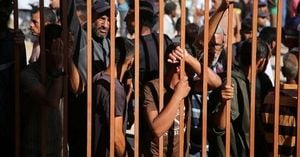Cierra Ortega’s sudden exit from the seventh season of Love Island USA has ignited a fierce conversation about accountability, social media, and the far-reaching consequences of past mistakes. The 25-year-old contestant, who entered the villa as a bombshell in episode two and quickly formed a close, exclusive relationship with fellow islander Nic Vansteenberghe, was abruptly removed from the show on July 6. Narrator Iain Stirling cited a “personal situation” for her departure, but fans quickly connected the dots to resurfaced offensive posts from Ortega’s past, which included the use of a racial slur targeting the Asian community.
According to multiple sources, including Glamour and Variety, the controversy erupted when old videos and posts by Ortega surfaced on social media, showing her using an “incredibly offensive and derogatory term.” Fans were particularly upset because some believed she continued to use the slur even after being informed of its hurtful nature. Ortega has since denied this, explaining on Instagram that she had a meaningful conversation with a follower who alerted her to the word’s offensive meaning, and she immediately removed it from her vocabulary.
“When this person did message me, I’m so grateful that she did, I had a good conversation with her about it. I made the correction immediately. The word was immediately removed from my vocabulary,” Ortega said on July 9. She emphasized that while there are “tons of things floating around” with varying timestamps and screenshots, the narrative that she doubled down on using the slur is false. “In that moment, the lesson was learned. The word was removed.”
Ortega also revealed that she has since used her experience to educate others who might unknowingly use offensive language. She expressed agreement with the producers’ decision to remove her from the villa, acknowledging the seriousness of the situation and the impact of her actions.
Her departure left Nic Vansteenberghe officially single, though not for long. As the drama unfolded, Nic rekindled a previous romance with fellow islander Olandria, and by the end of the episode, they became exclusive. Meanwhile, the other Islanders were kept in the dark about the specifics of Ortega’s exit. Former contestant Zak revealed in a TikTok Live that producers told them Ortega had “broken some of the policies of our guidelines” but provided no further details.
Ortega’s exit has sparked a wave of backlash online, with fans flooding her social media accounts with hate and death threats, many of which have tragically extended to her family and friends. The situation escalated to the point where Immigration and Customs Enforcement (ICE) was reportedly called on her family, forcing them to fear for their safety in their own home. Ortega described this as “extremely, extremely difficult” and pleaded for kindness and understanding. “There’s no need to fight hate with hate,” she said, urging fans to consider the human toll of their actions.
Her family also spoke out via Instagram, acknowledging the need for accountability while condemning the severity of the online harassment. “We understand why people are upset, and we know accountability matters. But what’s happening online right now has gone far beyond that,” they wrote. They highlighted that Ortega had yet to process the ordeal fully and expressed hope that she would face it with “honesty, growth, and grace” upon her return.
In a detailed Instagram post, Ortega took full responsibility for the offensive language she used, apologizing directly to the Asian community. “I am deeply, truly, honestly, so sorry,” she said. “I had no idea that the word held as much pain, as much harm, and came with the history that it did, or I never would have used it. I had no ill intention when I was using it, but that’s absolutely no excuse because intent doesn’t excuse ignorance.”
Ortega’s apology and explanation highlight a crucial aspect of this controversy: ignorance versus intent. While she claims she was unaware of the word’s full impact at the time, she acknowledges that ignorance is not an excuse and accepts the consequences of her actions.
The incident has reignited discussions about the responsibility of reality TV contestants and the role of social media in shaping public perception. Love Island USA has faced similar issues this season, having already removed another contestant, Yulissa Escobar, for using a racial slur. The show’s producers appear determined to uphold strict guidelines to prevent offensive behavior, even if it means cutting contestants mid-season.
Host Ariana Madix has also addressed the fanbase’s sometimes toxic behavior, urging viewers not to harass contestants or their families. “Don’t be contacting people’s families, don’t be doxing people, don’t be going on Islanders’ pages and saying rude things—you still have time to delete all of that,” she said during an episode of Aftersun, the show’s biweekly recap. “This is a fun, amazing, beautiful show, and we should be thanking each of these Islanders every single day for giving us themselves.”
As the season finale approaches on July 13, the fallout from Ortega’s departure lingers. Over a billion minutes of viewing have been logged this season, with 40% of viewers tuning in for the first time, underscoring the show’s massive reach and influence. Whether Ortega will be invited to the reunion remains uncertain, but the incident serves as a stark reminder of how swiftly social media history can impact lives and careers.
In the end, Ortega’s story is a cautionary tale about the power of words and the importance of growth and accountability. While her past mistakes have cost her a place in the villa, her willingness to apologize and educate others may offer a path forward. As she asked her followers, “Please let me grow with grace,” a plea that resonates far beyond the confines of reality TV.





